144 Search Results for isaac
July 8, 2020
by Carole Zangari -
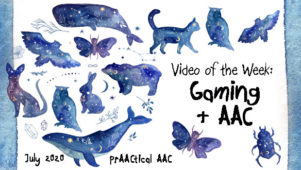
Whether you are in a part of the world that is re-opening or still hunkering down in relative isolation, we can all use a little diversion. In today’s featured video, SLP Shaun Pearson covers ways that we can use board games, role-playing games, and story-based games to support language learning by individuals with AAC needs. If you are looking to add some fun activities to the lives of the AAC learners with whom you work, you’ll find a lot of creative suggestions in this video which was hosted by ISAAC Canada and offered with the support of ISAAC. Resources for digitally adapted games and printable materials are also shared. You can obtain the slides for this session here and view additional resources here. Many thanks to Shaun for this engaging presentation, to ISAAC Canada for organizing and hosting it, and to ISAAC for their support of this webinar series. Enjoy!... [Read More...]
June 24, 2020
by Carole Zangari -
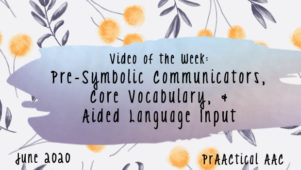
What is the role of core vocabulary and aided language input for communicators who are not yet using symbols to express themselves? SLP Kathryn Dorney, from the Center for Disability and Literacy Studies at the University of North Carolina, provides a perspective in this archived presentation. It is part of the webinar series offered by USSAAC with the support of ISAAC. You can view the handout for this session here. Many thanks to Kathryn, USSAAC, & ISAAC for making this presentation available. Direct Link to Video – https://www.youtube.com/watch?time_continue=24&v=hhIEoPpoR-k&feature=emb_logo
May 28, 2020
by Carole Zangari -
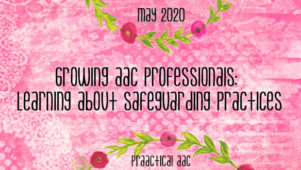
There are some things we’d rather not talk about. Sexual abuse toward people with complex communication needs is one of them. In today’s post, Vicki Haddix, a Clinical Assistant Professor at the University of Memphis, is back to share the experiences of her most recent students and a project they completed to educate young AAC users about this topic. :::::::::::::::::::::::::::::::::::::::::::::::::::::::::::::::::::::: As I mentioned in my previous post, I’ve tried to incorporate the principles of UDL when designing my AAC course. Another way I do that is by giving students choices within assignments of blogs, webinars, and podcasts to read, view, and listen to in order to gain other perspectives on AAC. Hopefully, this also encourages lifelong learning, as we cannot possibly cover everything future SLPs need to know about AAC in a single class. But PrAACtical AAC as well as blogs by people who use AAC, ongoing webinar series like... [Read More...]
May 21, 2020
by Carole Zangari -
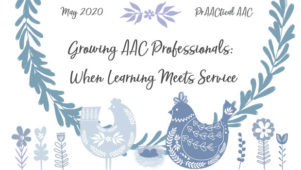
Teaching AAC to future SLPs is a longstanding passion of mine so when a fellow instructor, Vicki Haddix, reached out to talk about the AAC projects her graduate students had done, I knew that I wanted to share them with you. In today’s post, Vicki, a Clinical Assistant Professor at the University of Memphis, tells us about her most recent students and their projects. The materials they created can be used by parents and professionals alike. Make sure to check out the link at the bottom to access the full array of materials that these talented students created. Enjoy! ::::::::::::::::::::::::::::::::::::::::::::::::::::::::::::::::::::::::::::::::::::::::::::::::::::::::::: As a professor, it’s always exciting when you see the great work that graduate students are doing and think about the potential that they are bringing to the field. I’ve taught the AAC class at the University of Memphis’s SLP graduate program for 5 spring semesters, and I always learn... [Read More...]
April 15, 2020
by Carole Zangari -
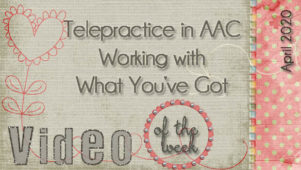
Given the increased demand for remote AAC services, we are continuing to highlight videos on this topic. Today, we feature an archived webinar from ISAAC with practical tips and strategies for effective AAC telepractice. Hillary Jellison and Nerissa Hall, whose previous article on Tele-AAC can be found here, discuss privacy, candidacy, and other important issues that impact our use of telepractice and provide us with practical information about providing these services. To view the closed captioning in other languages, view this in Youtube using the link at the bottom and select the autotranslate option. You can obtain the handout for this session here. Direct Link to Video – https://www.youtube.com/watch?v=fkslnsio054&feature=youtu.be
December 12, 2019
by Carole Zangari -
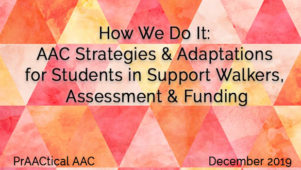
How can we reduce the negative impact of significant motor challenges on children who use AAC and are not independently mobile? Today, we conclude Christine Wright-Ott’s series on this topic. Christine is an Occupational Therapist and consultant at The Bridge School in Hillsborough California. She authored the chapter, Mobility, in several editions of the book, Occupational Therapy for Children. Christine lectures at universities and conferences including ATIA, Closing the Gap, ISAAC, ISS, and AAC by the Bay. If you missed the earlier posts in this series you can catch up via the links below. Part 1: From Wheelchair to Walker: The Cascading Benefit of Hands-Free Mobility Part 2: From Wheelchair to Hands-free Walker for Preschool Children with AAC Needs Part 3: How We Do It: A Support Walker Mobility Program for Elementary Students with AAC Needs ::::::::::::::::::::::::::::::::::::::::::::::::::::::::::::::::::::::::::::::::::::::::::: AAC Strategies, Adaptations for Students in Support Walkers, Assessment & Funding AAC Strategies and... [Read More...]
November 14, 2019
by Carole Zangari -
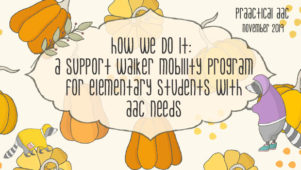
We’re very pleased to welcome back Christine Wright-Ott to continue the series on supporting the independent mobility of children with AAC needs. Christine is an Occupational Therapy consultant at the Bridge School in northern California. She authored the chapter “Mobility” in the 4-7th editions of the book, Occupational Therapy for Children. She lectures at universities and conferences including ATIA, Closing the Gap, ISAAC, ISS, and AAC by the Bay. Today, she discusses the ways she and her colleagues help elementary school students use support walkers. You can read the first two installments of this series using the links below. Part 1: From Wheelchair to Walker: The Cascading Benefit of Hands-Free Mobility Part 2: From Wheelchair to Hands-free Walker for Preschool Children with AAC Needs The Support Walker Mobility Program for Elementary Students with AAC needs The second post in this series described the Preschool hands-free Support Walker Mobility Program developed at... [Read More...]
October 30, 2019
by Carole Zangari -
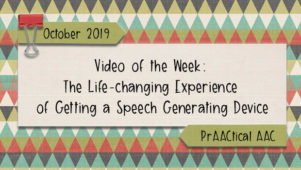
For individuals with complex communication needs can change so many things in their lives. In today’s featured video, AAC user Todd Hutchinson discusses how getting a speech-generating device at agee 16 impacted his life. We are grateful to USSAAC and ISAAC for making this video available. Direct Link to Video: https://www.youtube.com/watch?v=ySraK1B4qdc
October 10, 2019
by Carole Zangari -
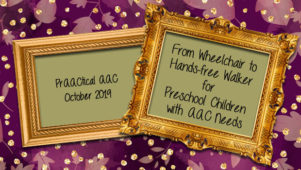
We are excited to share the second post in Christine Wright-Ott’s series on promoting hands-free independent mobility in young AAC learners. Christine is an Occupational Therapist and consultant at The Bridge School in Hillsborough California. She authored the chapter “Mobility” in the 4-7th editions of the book, Occupational Therapy for Children. She lectures at universities and conferences including ATIA, Closing the Gap, ISAAC, ISS, and AAC by the Bay. Enjoy! Support Walker Mobility at the Bridge School I would like to share with you an innovative hands-free Support Walker Mobility Program developed at The Bridge School, which is a private school for preschool and elementary children with complex communication and physical disabilities located on the district’s public elementary school campus. It is dedicated to ensuring that students achieve full participation in their communities through the use of augmentative & alternative means of communication (AAC), mobility and assistive technology (AT) applications. ... [Read More...]
September 12, 2019
by Carole Zangari -
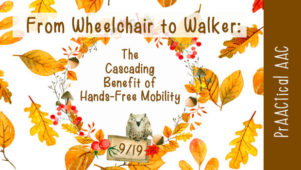
When young children with significant motor challenges are unable to move freely around the environment, it impacts many things. Today, we introduce a limited series on why hands-free mobility is so crucial during the early years, and what we can do to promote independent mobility. We are extremely fortunate to have Christine Wright-Ott authoring this series. Christine is an Occupational Therapist and consultant at The Bridge School in Hillsborough California. She authored the chapter, Mobility, in several editions of the book, Occupational Therapy for Children. Christine lectures at universities and conferences including ATIA, Closing the Gap, ISAAC, ISS, and AAC by the Bay. ::::::::::::::::::::::::::::::::::::::::::::::::::::::::::::::::::::::::::::::::::::::: Why Hands-free Mobility Matters for Children with AAC Needs Speech-language pathologists and occupational therapists have long been aware of the many ways that mobility and communication go hand-in-hand. Without a way to move around, a child’s opportunities for incidental learning and motivation to communicate are severely... [Read More...]









